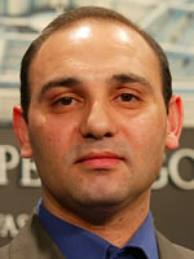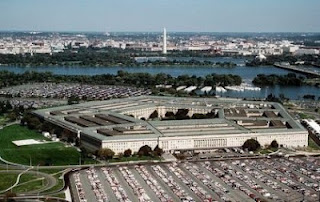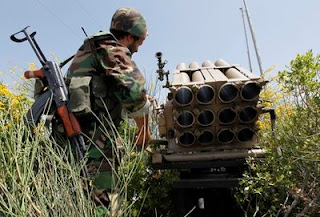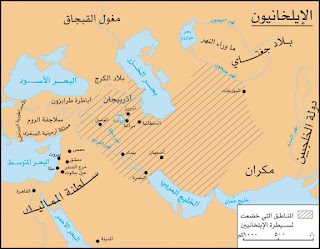Don't bet on a U.S.-Hizbullah dialogue - by Dr Haytham Mouzahem
Don't bet on a U.S.-Hizbullah dialogue
August 20, 2005 12:00 AM
By Haytham Mouzahem
Following the recent statement by Lebanese Labor Minister Tarrad Hamade (whose appointment was backed by Hizbullah) that last spring he had held talks with American officials, and that these had been approved by Hizbullah, questions arose as to whether a dialogue has started between Washington and the Shiite party. Given Hizbullah's hostility toward the U.S. and the fact that the U.S. government considers Hizbullah a terrorist organization, any dialogue would reflect a sharp reversal of position on both sides.
In Washington, Hamade met with officials at the State Department, including Elizabeth Dibble, a deputy assistant secretary of state. However, an American source insisted there was no U.S.-Hizbullah dialogue, because American officials are barred from contacts with any group designated a "foreign terrorist organization" by the U.S. State Department. This doesn't apply to Hamade, a self-described supporter of Hizbullah but not a party member.
The U.S. has repeatedly criticized Hizbullah for its attacks against Israeli military positions in the Shebaa Farms area and its support for militant Palestinian groups. It has also called on the Lebanese government to disarm Hizbullah in line with UN Security Council Resolution 1559. Washington blames Hizbullah for its attacks against American soldiers and civilians during the 1980s, especially the attacks against the U.S. Embassy and the Marine compound in 1983, and the kidnapping of American citizens then and later on.
Hamade has urged the Bush administration to change its policy on Hizbullah and open a direct line to the party. However, he denied he was an intermediary and criticized "the diplomacy of closing doors and opening windows," in reference to the fact that while the U.S. does not mind talking to him, it announced it would boycott Electricity and Water Resources Minister Mohammad Fneish, who is a member of Hizbullah.
Fneish has also denied that any sort of dialogue is taking place between Hizbullah and the U.S., saying the party would not change its position toward the American administration, which has adopted "hostile" policies toward Arabs and Muslims while favoring Israel. Fneish also rejected American interference in Lebanese affairs, and accused the U.S. administration of having not "forgiven" the resistance its victory against the Israeli occupation of Lebanon. Indeed, when Secretary of State Condoleezza Rice visited Beirut recently, she declared that Hizbullah has a "bloody record," in reference to its attacks against Americans.
A State Department official told me in December 2004 that "the first step for Hizbullah is to dissolve its militia and end support for terrorism. Hizbullah knows what it needs to do to accommodate with our views." He added the America government did not yet have any approach to deal with Hizbullah once it became a political party.
Another U.S. official said that there was "no way to engage with Hizbullah, no way we can have discussions with this group, no way we can view it as a positive force in South Lebanon, because they have committed violent acts against Israeli civilians." While the official recognized that Hizbullah has economic and social influence in Lebanon, and had representatives in Parliament, it had to "get out of the terrorism business, [which] might be a reason to take a look towards Hizbullah and how they do that."
He also admitted that Hizbullah had earned much legitimacy because it was viewed as a force fighting the Israeli occupation of the South; "but after the Israeli withdrawal, Hizbullah was not satisfied with just maintaining its presence [there], and there has been an extension of Hizbullah influence inside the Palestinian territories; there has been proof of its involvement in the violence against Israel." There was also evidence, he added, that Hizbullah had helped the Palestinians to launch Qassam-2 rockets against Israeli targets.
Hence, there are at least two reasons hindering dialogue between the U.S. and Hizbullah: the first is judicial-bureaucratic, the other is ideological. However, it might be fair to say that the both parties want to explore the results of a potential dialogue and also need a political truce. Washington wants to ensure stability and security in Lebanon now that the Syrians have left, and knows that confronting Hizbullah would destabilize the country. So, keeping pressure up to implement Resolution 1559 will not help the newly-elected Lebanese government and could cause a civil war, which would allow Syria to interfere once again in Lebanon's affairs. Furthermore, instability would threaten the relative status-quo on the Lebanese-Israeli border, which the U.S. has tried to maintain, particularly prior to the Israeli withdrawal from Gaza.
Hizbullah also seeks to absorb international pressure aiming to dissolve and disarm its militia through Resolution 1559. It's for that reason that the party allowed the meetings between Hamadeh and U.S. officials. But that also underlines how, for the moment, the maneuvering is tactical; it is far too early to talk about a reconciliation between the U.S. and Hizbullah, nor do regional developments, particularly the movement rightward of the Iranian regime, make this any more likely.
Haytham Mouzahem is a Lebanese analyst and researcher who specializes in Middle Eastern and Islamic affairs. He wrote this commentary for THE DAILY STAR.
August 20, 2005 12:00 AM
By Haytham Mouzahem
Following the recent statement by Lebanese Labor Minister Tarrad Hamade (whose appointment was backed by Hizbullah) that last spring he had held talks with American officials, and that these had been approved by Hizbullah, questions arose as to whether a dialogue has started between Washington and the Shiite party. Given Hizbullah's hostility toward the U.S. and the fact that the U.S. government considers Hizbullah a terrorist organization, any dialogue would reflect a sharp reversal of position on both sides.
In Washington, Hamade met with officials at the State Department, including Elizabeth Dibble, a deputy assistant secretary of state. However, an American source insisted there was no U.S.-Hizbullah dialogue, because American officials are barred from contacts with any group designated a "foreign terrorist organization" by the U.S. State Department. This doesn't apply to Hamade, a self-described supporter of Hizbullah but not a party member.
The U.S. has repeatedly criticized Hizbullah for its attacks against Israeli military positions in the Shebaa Farms area and its support for militant Palestinian groups. It has also called on the Lebanese government to disarm Hizbullah in line with UN Security Council Resolution 1559. Washington blames Hizbullah for its attacks against American soldiers and civilians during the 1980s, especially the attacks against the U.S. Embassy and the Marine compound in 1983, and the kidnapping of American citizens then and later on.
Hamade has urged the Bush administration to change its policy on Hizbullah and open a direct line to the party. However, he denied he was an intermediary and criticized "the diplomacy of closing doors and opening windows," in reference to the fact that while the U.S. does not mind talking to him, it announced it would boycott Electricity and Water Resources Minister Mohammad Fneish, who is a member of Hizbullah.
Fneish has also denied that any sort of dialogue is taking place between Hizbullah and the U.S., saying the party would not change its position toward the American administration, which has adopted "hostile" policies toward Arabs and Muslims while favoring Israel. Fneish also rejected American interference in Lebanese affairs, and accused the U.S. administration of having not "forgiven" the resistance its victory against the Israeli occupation of Lebanon. Indeed, when Secretary of State Condoleezza Rice visited Beirut recently, she declared that Hizbullah has a "bloody record," in reference to its attacks against Americans.
A State Department official told me in December 2004 that "the first step for Hizbullah is to dissolve its militia and end support for terrorism. Hizbullah knows what it needs to do to accommodate with our views." He added the America government did not yet have any approach to deal with Hizbullah once it became a political party.
Another U.S. official said that there was "no way to engage with Hizbullah, no way we can have discussions with this group, no way we can view it as a positive force in South Lebanon, because they have committed violent acts against Israeli civilians." While the official recognized that Hizbullah has economic and social influence in Lebanon, and had representatives in Parliament, it had to "get out of the terrorism business, [which] might be a reason to take a look towards Hizbullah and how they do that."
He also admitted that Hizbullah had earned much legitimacy because it was viewed as a force fighting the Israeli occupation of the South; "but after the Israeli withdrawal, Hizbullah was not satisfied with just maintaining its presence [there], and there has been an extension of Hizbullah influence inside the Palestinian territories; there has been proof of its involvement in the violence against Israel." There was also evidence, he added, that Hizbullah had helped the Palestinians to launch Qassam-2 rockets against Israeli targets.
Hence, there are at least two reasons hindering dialogue between the U.S. and Hizbullah: the first is judicial-bureaucratic, the other is ideological. However, it might be fair to say that the both parties want to explore the results of a potential dialogue and also need a political truce. Washington wants to ensure stability and security in Lebanon now that the Syrians have left, and knows that confronting Hizbullah would destabilize the country. So, keeping pressure up to implement Resolution 1559 will not help the newly-elected Lebanese government and could cause a civil war, which would allow Syria to interfere once again in Lebanon's affairs. Furthermore, instability would threaten the relative status-quo on the Lebanese-Israeli border, which the U.S. has tried to maintain, particularly prior to the Israeli withdrawal from Gaza.
Hizbullah also seeks to absorb international pressure aiming to dissolve and disarm its militia through Resolution 1559. It's for that reason that the party allowed the meetings between Hamadeh and U.S. officials. But that also underlines how, for the moment, the maneuvering is tactical; it is far too early to talk about a reconciliation between the U.S. and Hizbullah, nor do regional developments, particularly the movement rightward of the Iranian regime, make this any more likely.
Haytham Mouzahem is a Lebanese analyst and researcher who specializes in Middle Eastern and Islamic affairs. He wrote this commentary for THE DAILY STAR.





Comments
Post a Comment